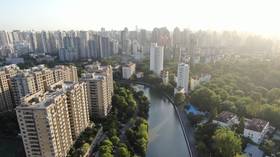China Evergrande Group founder and chairman Hui Ka Yan has sold more of his own shares in the company this week in an attempt to keep the defaulted property developer afloat.
Once China’s second-richest person, Hui sold 277.8 million shares, lowering his stake in the company to 59.78% from 61.88%, according to Friday’s filings to the Hong Kong stock exchange. The transaction value was not disclosed, but given the average price at which the shares traded this week, it was likely around $64 million.
Hui, who was worth $42 billion in 2017 and only $6.3 billion this year, according to the Bloomberg Billionaires Index, is selling stock to raise the funds to pay off Evergrande’s $300-billion debts. Earlier this week, Fitch Ratings declared the property development company to be in default of its dollar debt, after it was unable to pay $1.2 billion in bond repayments within the grace period, which expired on Monday.
The authorities in Guangdong summoned Hui to account for Evergrande’s current position last week, after the firm announced it might be unable to repay the debt. It has pledged to “actively engage” with offshore creditors on a restructuring plan, and a working group has been sent to assist it in managing its risks. It had also missed a deadline to pay off liabilities totaling $82.5 million in early November. Hui sold 1.2 billion shares later that month to help clear some of the company’s mounting debts, and also mortgaged assets and sold off his private jets for the cause.
Evergrande is the second-largest residential real estate company in China, with more than 1,300 projects across 280 cities. Work on many of them has now been put on hold, including the Guangzhou Evergrande Football Stadium and several amusement parks that it had hoped would rival Disneyland.
For more stories on economy & finance visit RT’s business section

